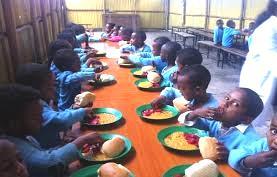Cross River government Says they would commence feeding 130000 pupils in schools
The Cross River State Government has revealed its plan to commence the feeding of 130,000 pupils in over 1,000 public schools before the end of April.
The schools targeted include Pre-Primary, Primary and Junior secondary schools and will “not exceed 150 pupils in primaries one to three in all public schools in the 18 local government areas of Cross River State, with menu prepared from only locally available foods in the state” said Gabriel Okulaja, the Special Adviser food bank to Governor of Cross River, Ben Ayade who announced this in a workshop held in partnership with the Federal Government Special Investment Program of the Office of the Vice President in his office in Calabar.
See Governor Ben Ayade in CRUTECH.. click below to see
See Governor Ben Ayade in CRUTECH.. click below to see
“We are to start feeding children in schools in about six weeks. A lot of work has been done. The first level is getting the schools, which we identified. We have also identified the number of vendors we need. The program provides for a number of people to be fed by a number of vendors” Okulaja said.
“A vendor is supposed to do a maximum of 150 per day. We have agreed on the state implementation framework, and the menus. We now go into the next level, which is the final screening of the vendors, which relates to their medicals and training based on the outcome of this workshop.
“An estimated number of pupils have not been fixed yet. We are still verifying the numbers. But what we have captured is about 130, 000. That is for the entry level. The final number would be out in about two weeks. Benefiting schools will be about 1,100 schools across the state. We are looking at nothing less than 1,000 vendors.”
He said Cross River State will be a “leading platform for sustaining the school feeding program” which he said also aims at eradicating poverty and will lead to the development of the state.
“We also have to enhance the value chain which has to do with the agricultural sector. We want to grow a local economy that would ensure we have sustainable communities,” Okulaja said.



Comments